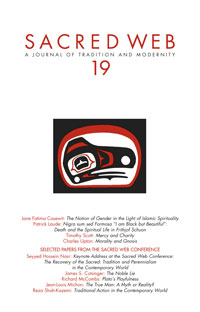Sacred Web 19
Editorial: The Secular and the Sacred
by M. Ali Lakhani
Basing its critique of secularism and religious fundamentalism on the Traditional view of the sacred foundation of knowledge, this essay outlines the false premises of secularism, as an aspect of modernism, and its relationship to religious fundamentalism, pointing to the importance of Tradition as the ‘middle way’ between the errors of secular and religious dogmatism.
Keynote Address at the Sacred Web Conference:
The Recovery of the Sacred:
Tradition and Perennialism in the Contemporary World
by Seyyed Hossein Nasr
This is the edited text of the keynote address made at the Sacred Web Conference in September, 2006, by the most important living Traditionalist. Professor Nasr defines certain key terms relating to ‘Tradition’ and discusses the vital relevance of Tradition to issues confronting modernity.
Traditional Action in the Contemporary World
by Reza Shah-Kazemi
Dr. Shah-Kazemi penetrates to the heart of the human métier in considering the meaning of Traditional action in the contemporary world, and identifies it as an affirmation of the Presence of the Absolute that involves the effacement of the actor in the very process of acting.
The True Man: A Myth or Reality?
by Jean-Louis Michon
Dr. Michon, who, in his life was privileged to know several examples of ‘True Men’, illustrates, through recollections of his personal encounters, how it is possible in the contemporary world to be guided and initiated into a Traditional path by certain privileged and ‘awakened’ human beings who embody the ideal of nobility—of the ‘True Man’.
The Noble Lie
by James S. Cutsinger
In this masterfully written tale, presented by Professor Cutsinger
at the Sacred Web Conference, he describes an imaginary encounter between a Traditionalist Professor and Socrates, in which the Professor engages in a dialogue with the Master about the difficulties of presenting metaphysical truths, and the need to have recourse to mythological truths (or noble lies) to communicate the ineffable.
Plato’s Playfulness
by Richard McCombs
Following the implications of Professor Cutsinger’s paper on the Noble Lie, this essay, also written for presentation at the Sacred Web Conference, illustrates how Plato skillfully teaches through indirect means designed to evoke a realization of metaphysical truths, and focuses on his ‘playfulness’ as an example.
Nigra sum sed Formosa “I am Black but Beautiful”:
Death and the Spiritual Life in Frithjof Schuon
by Patrick Laude
All awakening to Reality involves, in a certain sense, a dying. This essay considers the theme of death as a metaphor and as an esoteric reality, in the writings of Frithjof Schuon.
Mercy and Charity
by Timothy Scott
This scholarly survey of the relationship between Mercy and Charity as two of the Divine attributes, focuses on their symbolic and archetypal expression in the Abrahamic faith traditions, and elaborates on the Traditional significance and relationship of these attributes as spiritual qualities that define Man.
Morality and Gnosis
by Charles Upton
This essay is in three parts: the first considers the question of ‘gnostic morality’—the ability to be above ‘the curse of the law’; the second distinguishes between ‘sins of behavior’ and ‘sins of attention’ and illustrates this distinction through a survey of the Seven Deadly Sins; and the third concludes with a distinction between ‘morality’ that emerges from the duality of opposition and ‘gnosis’ that transcends it.
The Notion of Gender in the Light of Islamic Spirituality
by Jane Fatima Casewit
Starting from the metaphysical origination of ‘gender’ as aspects of polarities within the Divine Reality, the author goes on to survey the Muslim understanding of gender as an expression of the metaphysical principle of complementarity, and the symbolism of the feminine as it pertains to Islamic esoterism and mysticism, and then proceeds to discuss the implications of this view of gender in the light of contemporary attitudes towards gender roles and definitions.
Letter to the Editor




